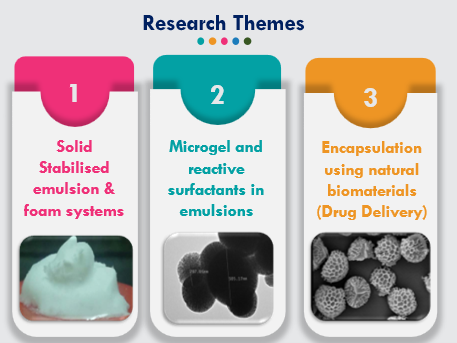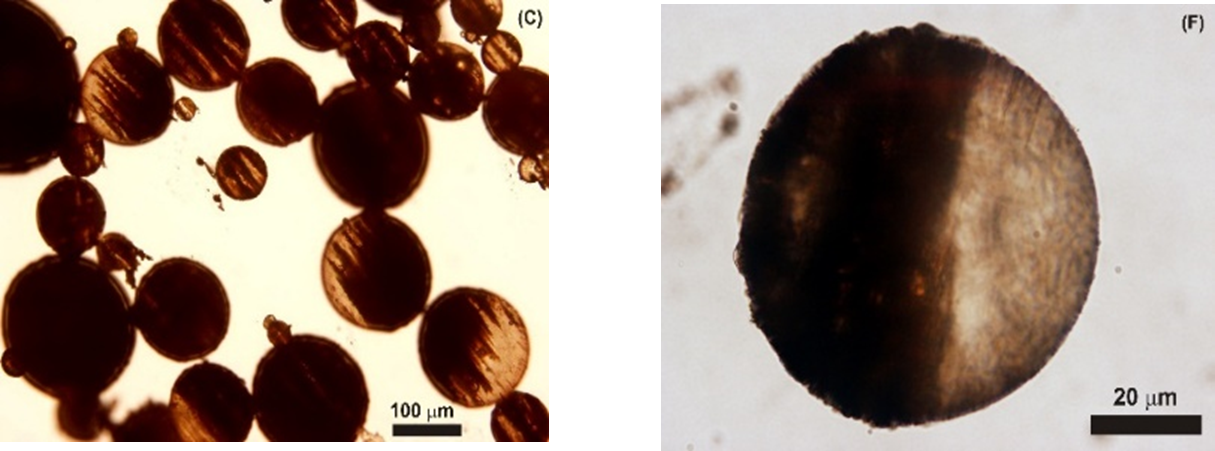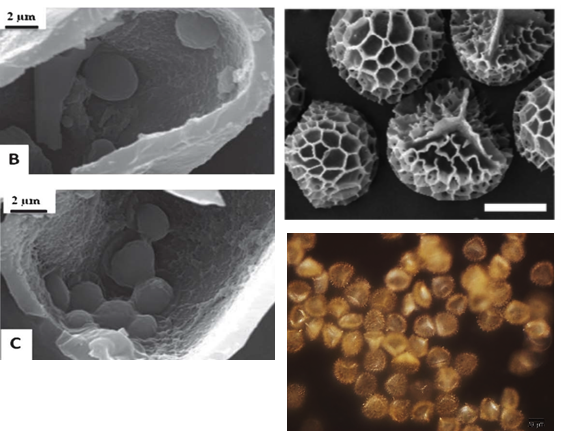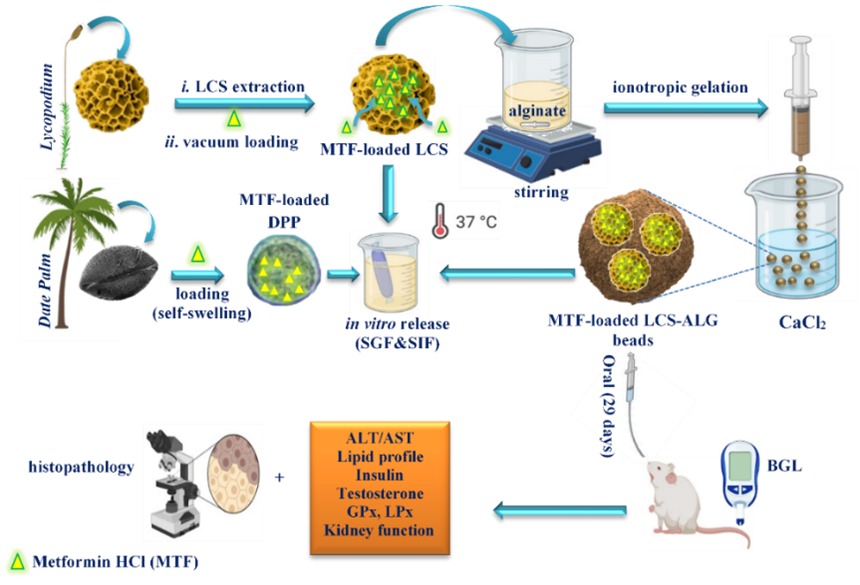
Research Interest
Biomedical applications of colloidal formulations; Biomaterials for drug delivery applications
My research interests span the areas of colloidal nanotechnology and materials science. I got my PhD degree in physical chemistry from the University of Hull, UK in 2004 under the supervision of Profs Paul Fletcher and Bernard Binks. My PhD work at Hull has been rewarding and productive and my study was concerned with using solid nanoparticles as simple and multiple emulsion stabilizers and exploring their behaviours at liquid-liquid interface. I also spent 2.5 years doing a very productive post-doc specialization in Prof. Vesselin Paunov research group at Hull, 2006-2008 where the research was focused on cutting-edge materials science, involving fabrication of polymeric magnetic Janus microparticles as well as colloidal nanoparticles for enhancement of magnetoresistance of composite magnetite/polymer films. From 2010-2013, I worked as associate professor at King Sauid University (KSA). The collaboration with Prof. Paunov was further extended through the Newton Researcher links travel grant funded by British Council during June 2015–Nov 2015 within his research group. I was promoted to full professor in physical chemistry in 2019 at Minia University and helped to expand our colloid and advanced materials group (CAM) founded by Prof F. Taha.
Collaboration with the following research groups:
Colloids and Advanced Materials (CAM) Research Group at Minia University

Some selected past and ongoing research plans for 3-5 years.
- Novel Devices for Light Control Based on Suspended Semiconductor Nanocrystals and Nanostructures
Suspensions of colloidal particles in liquid solvents are a promising tool for light control. When subjected to a strong electric field, colloidal suspensions form chains of particles between the electrodes as a result of the electric polarisation of the colloid particles in the solution and their orientational interaction with the external electric field.

- Fabrication of novel anisotropic magnetic microparticles
We developed a novel method for fabricating anisotropic magnetic microparticles with permanent magnetic dipole moments and of different morphologies. These microparticles can be magnetically manipulated by an external magnetic field in solutions. The fabrication method is based on “freezing” the magnetic polarisation of the hydrophobic oleic-acid coated magnetite nanoparticles (OCMNs) contained into the gelled monomer oil emulsion drops using an external magnetic field.

- Encapsulation of living cells into sporopollenin microcapsules
We demonstrate that living cells can be encapsulated inside sporopollenin microcapsules derived from Lycopodium clavatum. To encapsulate large objects like cells, the sporopollenin particles are compressed into a pellet which forces their trilite scars to open up. Our method involves exposing a sporopollenin pellet to an aqueous suspension of cells in the presence of a surface active agent which facilitates the capillary suction of the cells suspension inside the compressed sporopollenin and its ‘‘re-inflating’’ and closure of trilite scars. We demonstrate that the viability of the cells is preserved after the encapsulation in the sporopollenin capsules which contain a significant amount of entrapped cells and show biological activity when placed into a culture medium. Since the sporopollenin nanopores allow nutrient transport across the capsule wall, it could be used for controlling the rate of in situ fermentation reactions or as bio-reactors. We also show that sporopollenin can be loaded with magnetic nanoparticles and live cultures simultaneously which would allow remote manipulation, fixation, removal or potentially targeted delivery of such bio-microreactors. The encapsulation of living cells inside sporopollenin can be used for many different purposes in the food and pharmaceutical industries, including protection of probiotics in foods and delivery of live vaccines for pharmaceutical applications.

- Microgel nanoparticles as stabilises for non-aqueous emulsions
Non-aqueous emulsions with a high storage stability are stabilised with organic solvent-borne crosslinked poly(N-isopropylacrylamide-co-2-acrylamido-2-methylpropane sulfonic acid) poly(NIPAM-co-AMPS) microgels functionalised with a nonionic polymerisable surfactant (polyoxyethylene 4-nonyl-2-propyl-phenyl maleate ester). The oil–oil interfacial tensions are reduced to unprecedented values by the newly prepared microgels.

- Sustained in-vitro and in-vivo delivery of metformin from plant pollen-derived composite microcapsules
We developed a dual microencapsulation platform for the type 2 diabetes drug metformin (MTF), which is aimed to increase its bioavailability. We report the use of Lycopodium clavatum sporopol-lenin (LCS), derived from their natural spores, and raw Date Palm pollens (DPP) for MTF micro-encapsulation. MTF was loaded into the LCS and DPP via vacuum and a novel method of hydra-tion-induced swelling.

Selected publications:
- Abd El-Mageed, A. I. A.; Shalan, A. E.; Mohamed, L. A.; Essawy, H. A.; Taha, F.; Dyab, A. K. F. Effect of PH and Zeta Potential of Pickering Stabilizing Magnetite Nanoparticles on the Features of Magnetized Polystyrene Microspheres. Eng. Sci. 2021, 61 (1), 234–244. https://doi.org/10.1002/pen.25571.
- Abd El-Mageed, A. I. A.; Dyab, A. K. F.; Mohamed, L. A.; Taha, F.; Essawy, H. A. Suspension Polymerization for Fabrication of Magnetic Polystyrene Microspheres Stabilized with Hitenol BC-20. Bull. 2021. https://doi.org/10.1007/s00289-021-03755-1 .
- Meligi, N. M.; Dyab, A. K. F.; Paunov, V. N. Sustained In Vitro and In Vivo Delivery of Metformin from Plant Pollen-Derived Composite Microcapsules. Pharmaceutics 2021, 13 (7), 1048. https://doi.org/10.3390/pharmaceutics13071048.
- Dyab, A. K. F.; Mohamed, M. A.; Meligi, N. M.; Mohamed, S. K. Encapsulation of Erythromycin and Bacitracin Antibiotics into Natural Sporopollenin Microcapsules: Antibacterial, Cytotoxicity, in Vitro and in Vivo Release Studies for Enhanced Bioavailability. RSC Adv. 2018, 8 (58), 33432–33444. https://doi.org/10.1039/C8RA05499A.
- Mohammed, A.-S. Y.; Dyab, A. K. F.; Taha, F.; Abd El-Mageed, A. I. A. Encapsulation of Folic Acid (Vitamin B9) into Sporopollenin Microcapsules: Physico-Chemical Characterisation, in Vitro Controlled Release and Photoprotection Study. Sci. Eng. C 2021, 128, 112271. https://doi.org/10.1016/j.msec.2021.112271.
- Taha, N. F.; Dyab, A. K. F.; Emara, L. H.; Meligi, N. M. Microencapsulation of Diclofenac Sodium into Natural Lycopodium Clavatum Spores: In Vitro Release and Gastro-Ulcerogenic Evaluations. Drug Deliv. Sci. Technol. 2022, 71, 103278. https://doi.org/10.1016/j.jddst.2022.103278.
Fall 2023
- CHEM 101 – General Chemistry I



